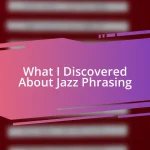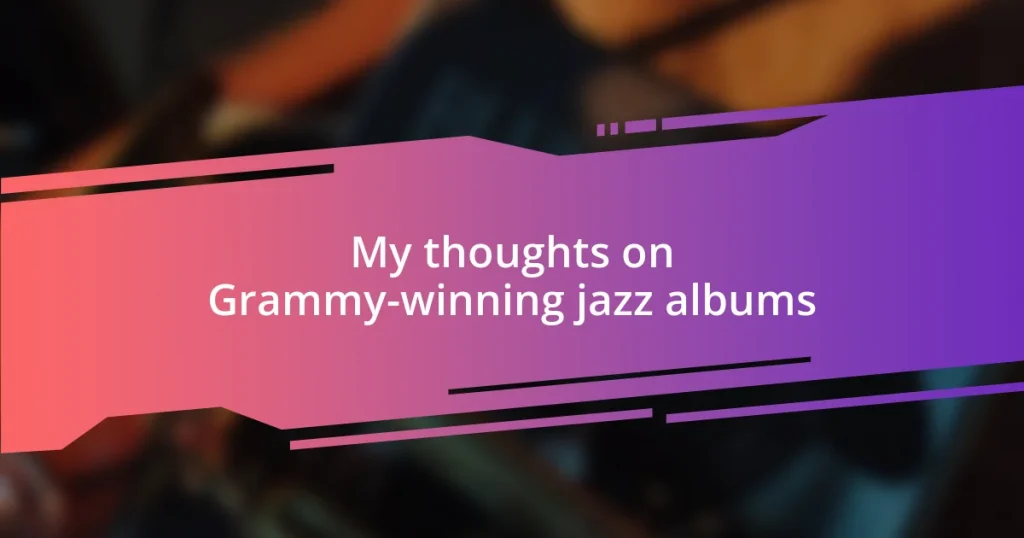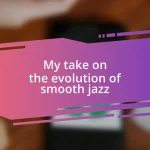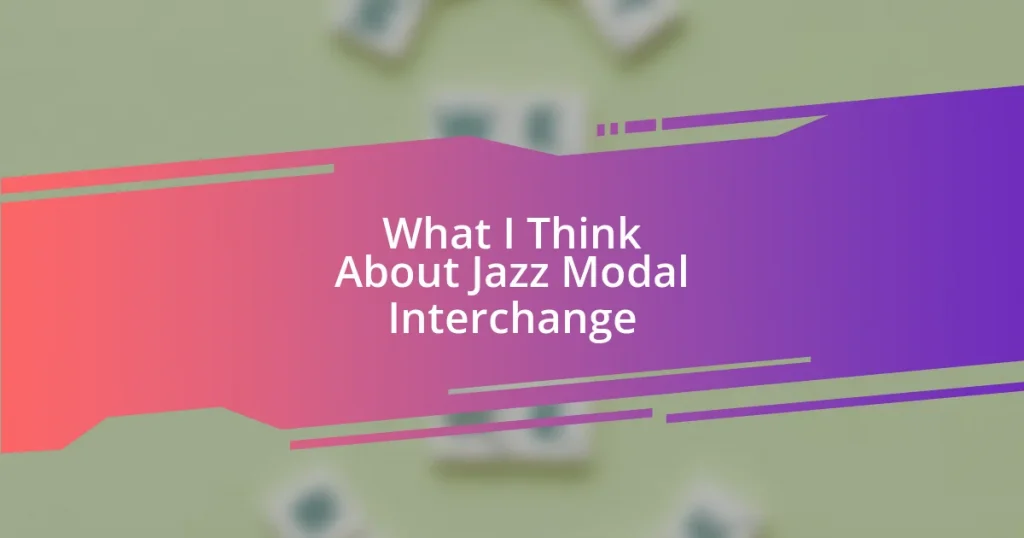Key takeaways:
- Grammy-winning jazz albums highlight the genre’s diversity and recognize both well-known and emerging artists, enhancing their reach.
- Key criteria for selecting standout jazz albums include musicianship, innovation, emotional connection, production quality, and cohesion.
- Notable jazz artists like Louis Armstrong, Duke Ellington, and John Coltrane have made significant contributions that continue to influence contemporary musicians and listeners.
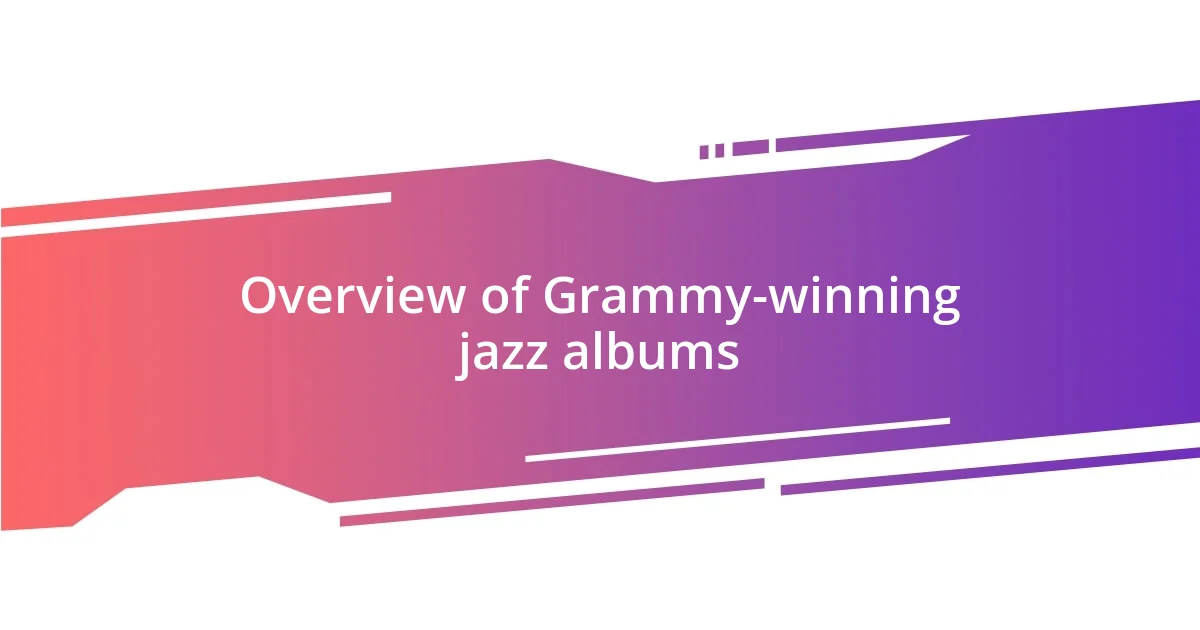
Overview of Grammy-winning jazz albums
Grammy-winning jazz albums represent the pinnacle of artistic achievement within the genre, showcasing not only exceptional talent but also innovation and creativity. I remember the first time I listened to a Grammy-winning album; it felt as if the music was speaking directly to my soul. Does anyone else feel that electric connection with a song that just makes you want to learn everything about the artist?
The winners of these prestigious awards cover a diverse array of styles, from traditional to contemporary jazz, highlighting the genre’s versatility. Each album often tells a unique story, woven through the intricate melodies and rhythms that define jazz. I reflect on the moments when a particular album not only elevated my understanding of the genre but also deepened my appreciation for its rich history.
Additionally, the Grammy Awards also bring recognition to lesser-known artists, propelling them into the spotlight and expanding the audience for jazz music. I find this aspect particularly inspiring, as it reminds me of the power of music to transcend barriers and connect people. How often have we all discovered new favorites simply because they won an award?
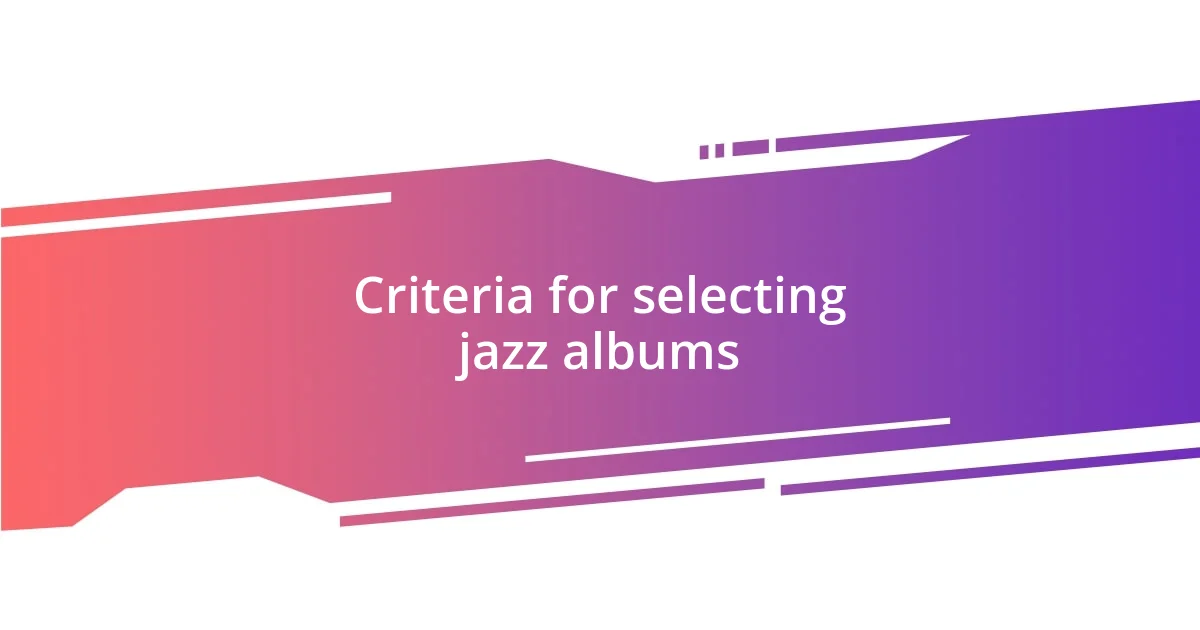
Criteria for selecting jazz albums
When selecting jazz albums, a few key criteria come to mind that truly differentiate the standout works from the rest. I often find myself gravitating toward albums that not only feature exceptional musicianship but also convey a deep emotional narrative. It’s that combination of technical skill and storytelling that resonates with me, making each listening experience more impactful.
Here are some criteria I consider:
- Musicianship: The technical ability of the artists involved; their improvisation skills and overall harmony play a huge role.
- Innovation: Albums that push the boundaries of jazz, experimenting with new sounds or merging genres.
- Emotional Connection: I often look for records that evoke strong feelings, whether joy, nostalgia, or introspection.
- Production Quality: Clear, well-balanced sound is crucial. I appreciate when an album is thoughtfully produced, as it enhances the listening experience.
- Cohesion: A well-structured album that tells a story or shares a common theme keeps me engaged from start to finish.
In my experience, I’ve often found that the best albums are the ones that allow for a personal connection. I remember listening to a particular Grammy-winning album late at night, feeling every note resonate within me. It was as if the music understood my mood, making the selection process not just about the artist’s prowess but also about the journey the album takes me on.
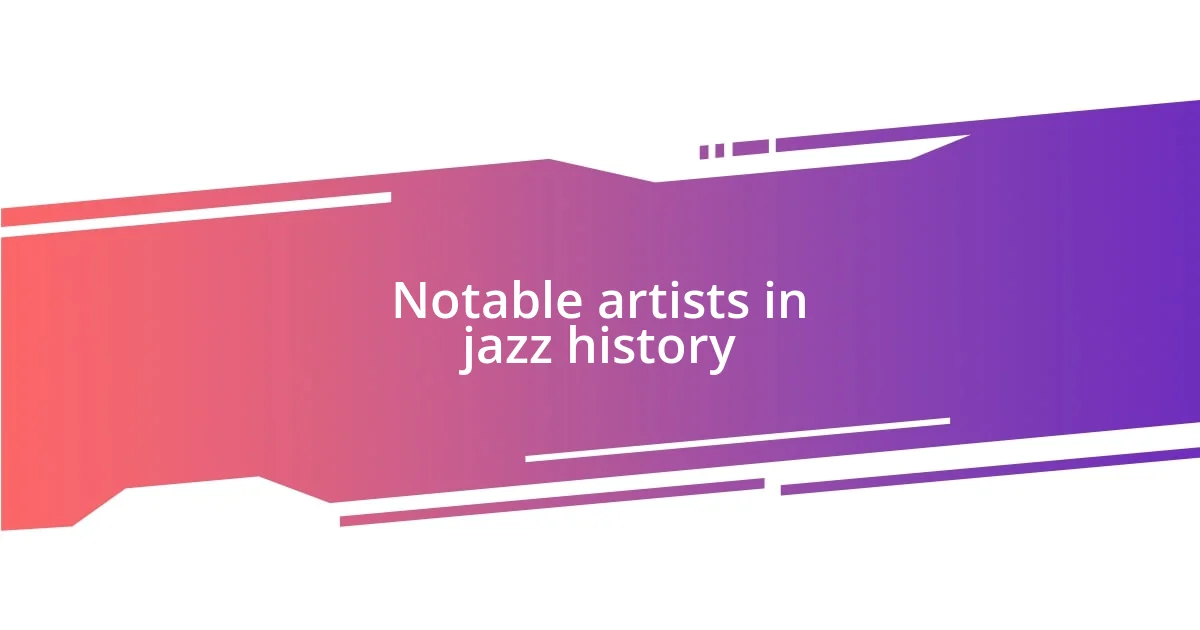
Notable artists in jazz history
Throughout jazz history, certain artists have emerged as pivotal figures, shaping the genre with their unique styles and profound influences. Take, for instance, Louis Armstrong. His virtuosic trumpet playing and distinctive gravelly voice not only redefined jazz but also created a lasting legacy that resonates with listeners even today. I still remember the first time I heard “What a Wonderful World”; it struck me how Armstrong’s warm vibrato brought an entirely new emotional depth to the song.
Then there’s the innovative Duke Ellington, whose compositions elevated jazz to a form of orchestral artistry. His blending of various styles and rich arrangements created a sonic tapestry that left an indelible mark on the music world. Listening to Ellington’s “Mood Indigo” always transports me to a different era, evoking emotions of nostalgia and sophistication. It’s remarkable how his work continues to inspire contemporary artists, demonstrating just how timeless his genius is.
Another notable artist is John Coltrane, known for his intense improvisation and spiritual approach to music. His album “A Love Supreme” is among my all-time favorites; I find that its transcendent quality often leads me to a state of deep reflection. Whenever I revisit it, I can’t help but feel an overwhelming sense of peace, reminding me of jazz’s ability to connect us to deeper emotional states.
| Artist | Notable Contribution |
|---|---|
| Louis Armstrong | Revolutionized jazz with his soulful trumpet and vocal style. |
| Duke Ellington | Elevated jazz to orchestral artistry through innovative compositions. |
| John Coltrane | Pioneered spiritual jazz with intense improvisation and deep emotional narratives. |
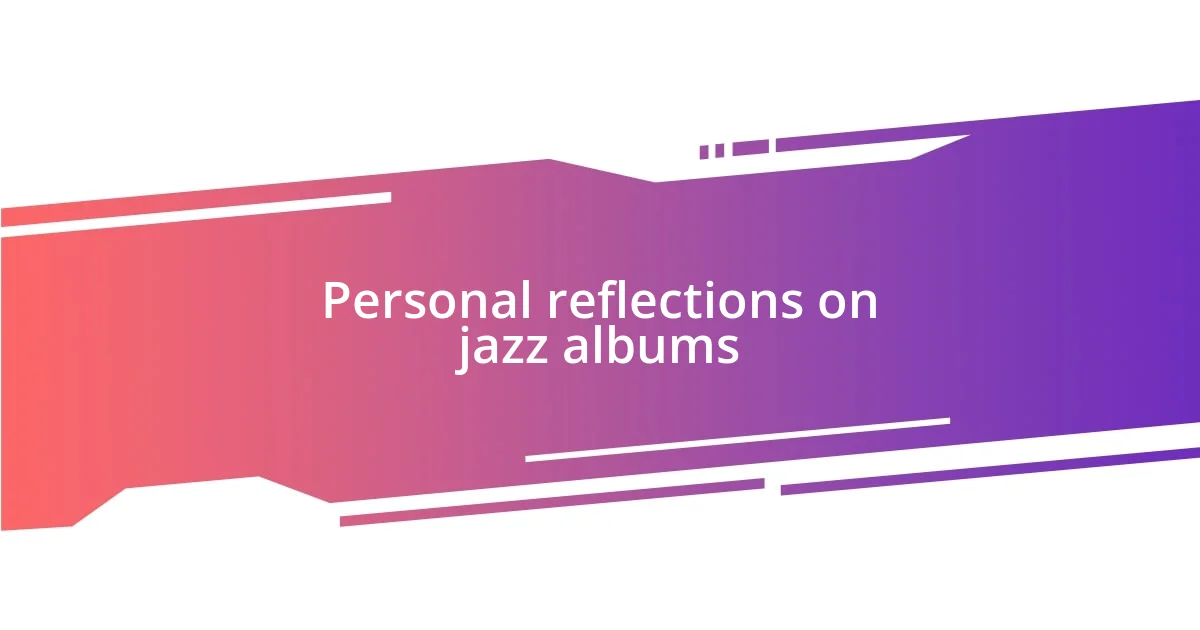
Personal reflections on jazz albums
Reflecting on my journey with jazz albums, I often find myself lost in the sheer beauty of the genre. There was a time when I stumbled upon an album by an artist I had never heard of before—its cover captured my attention first. As I listened, I was swept away by the intricate melodies and harmonies; it was a reminder of how music can transport us to different places and states of mind. Have you ever experienced an album that felt like a warm embrace, wrapping around you with every note? That’s what jazz does for me.
One particularly memorable moment involved spinning an old vinyl record late one evening. The crackling sound added a nostalgic layer, making the experience even more special. The jaw-dropping solos and beautiful arrangements felt like a personal conversation between the musicians and me. It was as if they were expressing emotions I couldn’t quite articulate. It’s fascinating how some albums have a way of reflecting our own feelings back to us, isn’t it?
Sometimes, when I revisit certain Grammy-winning albums, I’m struck by how they evolve with each listen. I recall diving into a live performance recording that seemed to capture the energy of the crowd and the spontaneity of the moment. Listening to it in a new context—perhaps while cooking or winding down after a long day—reveals layers I hadn’t noticed before. It’s as though the music is constantly speaking to me, adapting and changing as my own life does. Isn’t it amazing how jazz manages to grow alongside us?

Recommendations for new listeners
When I think about introducing new listeners to jazz, I always recommend starting with Miles Davis’s “Kind of Blue.” This album is often described as accessible yet profound, providing an excellent entry point into the world of modal jazz. The soothing melodies and rich improvisation truly envelop you; I remember how it effortlessly set the perfect ambiance during my first dinner party, leaving everyone captivated by the sounds.
Another great choice is Norah Jones’s “Come Away With Me.” This Grammy-winning album beautifully blends jazz with elements of pop and soul, making it relatable for those who might not typically listen to jazz. I still recall a rainy afternoon where I played this album—it felt like the music just wrapped around me, a cozy blanket of sound that lifted my spirits. Have you ever experienced music making you feel such a way? It’s magic.
For those looking to dive deeper, I cannot stress enough the impact of listening to contemporary artists like Kamasi Washington. His album “The Epic” is an ambitious masterpiece that showcases the evolution of jazz today. I remember feeling overwhelmed by the richness and complexity of his compositions; it was a revelation that showed me how jazz can be both profound and inventive. Engaging with his work can lead to wonderful conversations about where jazz has been and where it’s headed—something I always find exciting!





